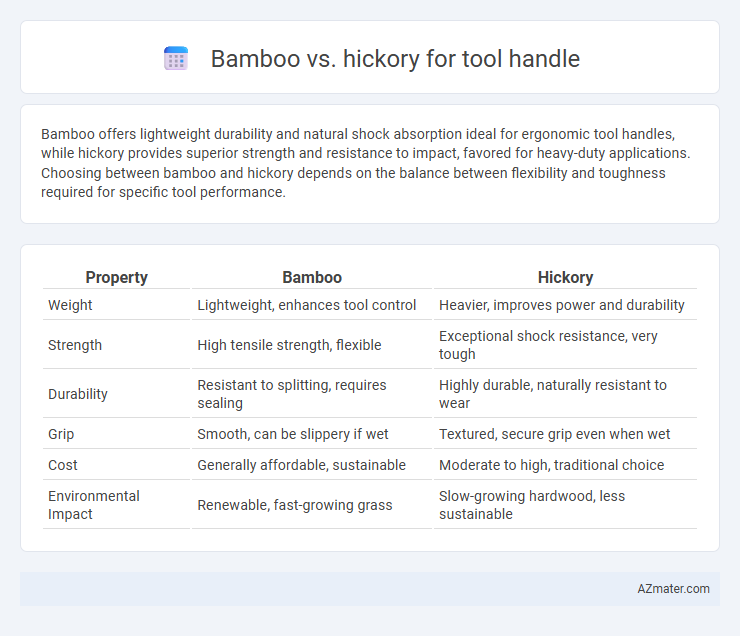Bamboo offers lightweight durability and natural shock absorption ideal for ergonomic tool handles, while hickory provides superior strength and resistance to impact, favored for heavy-duty applications. Choosing between bamboo and hickory depends on the balance between flexibility and toughness required for specific tool performance.
Table of Comparison
| Property | Bamboo | Hickory |
|---|---|---|
| Weight | Lightweight, enhances tool control | Heavier, improves power and durability |
| Strength | High tensile strength, flexible | Exceptional shock resistance, very tough |
| Durability | Resistant to splitting, requires sealing | Highly durable, naturally resistant to wear |
| Grip | Smooth, can be slippery if wet | Textured, secure grip even when wet |
| Cost | Generally affordable, sustainable | Moderate to high, traditional choice |
| Environmental Impact | Renewable, fast-growing grass | Slow-growing hardwood, less sustainable |
Introduction: Bamboo vs Hickory Tool Handles
Bamboo and hickory are popular materials for tool handles, each offering distinct advantages in strength and durability. Bamboo is lightweight, flexible, and highly sustainable, making it an eco-friendly choice for tool handles that absorb shock effectively. Hickory, known for its toughness and resistance to impact, provides superior durability and is favored for heavy-duty tools requiring robust performance.
Material Overview: Bamboo and Hickory Properties
Bamboo offers exceptional flexibility and lightweight durability, making it an ideal material for tool handles where shock absorption and ease of use are priorities. Hickory, known for its high density, toughness, and impact resistance, provides superior strength and longevity in heavy-duty applications. Both materials feature natural grain structures that enhance grip and comfort, but bamboo's rapid renewability contrasts with hickory's traditional use in high-performance hand tools.
Strength and Durability Comparison
Bamboo tool handles offer exceptional tensile strength and lightweight durability, making them ideal for reducing user fatigue during extended use. Hickory, known for its superior shock resistance and impact durability, excels in heavy-duty applications requiring high toughness and resistance to wear. When comparing strength and durability, hickory generally outperforms bamboo in impact resilience, while bamboo provides a sustainable alternative with notable flexibility and tensile strength.
Weight and Handling Differences
Bamboo tool handles are significantly lighter, offering enhanced maneuverability and reducing fatigue during prolonged use compared to hickory handles, which are denser and heavier. Hickory provides superior shock absorption and durability, making it ideal for heavy-duty tasks that require greater strength and impact resistance. The lightweight nature of bamboo improves control and precision, while hickory's robust weight delivers stability and power in demanding applications.
Flexibility and Shock Absorption
Bamboo tool handles offer superior flexibility due to their natural tubular fiber structure, which allows them to bend without breaking, enhancing user comfort during repetitive tasks. Hickory, known for its dense hardwood composition, provides excellent shock absorption by dissipating impact forces effectively, reducing hand fatigue during heavy-duty use. While bamboo excels in lightweight resilience, hickory remains preferred for durability and resistance to wear in demanding tool applications.
Resistance to Weather and Decay
Bamboo tool handles exhibit excellent resistance to weather due to their natural silica content, which makes them less prone to moisture absorption and decay compared to many woods. Hickory, while extremely strong and shock-resistant, is more susceptible to weathering and requires proper sealing to prevent rot and fungal decay over time. For outdoor tool handles exposed to varying weather conditions, bamboo offers superior durability against moisture and decay, making it a preferred choice in humid or wet environments.
Workability: Shaping and Finishing
Bamboo handles excel in workability due to their lightweight and flexible nature, allowing for easy shaping with standard woodworking tools and smooth finishing without excessive sanding. Hickory, known for its density and toughness, requires more effort to shape but provides superior durability and a fine finish that withstands heavy use. Both materials respond well to finishing oils or varnishes, enhancing grip and resistance to wear, though bamboo's natural smoothness often reduces preparation time before finishing.
Cost and Availability
Bamboo tool handles offer a cost-effective and sustainable alternative due to their rapid growth and widespread availability in many regions. Hickory handles, renowned for superior strength and shock absorption, tend to be more expensive and may be less accessible depending on geographic location. Choosing between bamboo and hickory hinges on balancing budget constraints with durability preferences.
Environmental Impact and Sustainability
Bamboo tool handles offer superior sustainability due to bamboo's rapid growth rate, renewable harvesting, and carbon sequestration capabilities, making it an eco-friendly alternative to traditional hardwoods. Hickory, while durable and strong, grows much slower and requires more intensive land and resource use, resulting in a higher environmental footprint. Choosing bamboo reduces deforestation pressures and promotes sustainable forestry practices in tool handle production.
Which Is Better for Your Tool Handle?
Bamboo offers lightweight durability and natural shock absorption, making it ideal for tool handles requiring comfort and ease of use. Hickory excels in strength, impact resistance, and longevity, preferred for heavy-duty tools exposed to intense wear and tear. Choosing between bamboo and hickory depends on the tool's intended use, where bamboo suits ergonomic needs and hickory delivers superior toughness.

Infographic: Bamboo vs Hickory for Tool Handle
 azmater.com
azmater.com